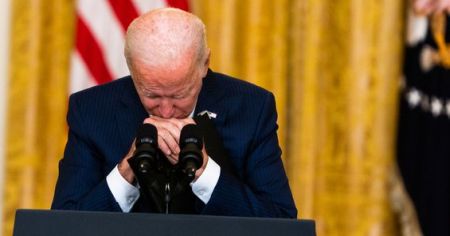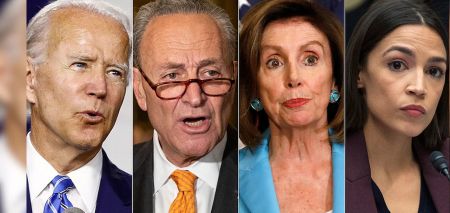By 45%–35%, respondents say they're specifically pessimistic about “the next few years with Joe Biden as President.”
By Dan McLaughlin
WASHINGTON, D.C. (Texas Insider Report) — A new YouGov National Tracking Poll covering 1,500 U.S. adults between September 26th-28th, 2021 is full of fascinating tidbits – and is loaded with grisly news of American pessimism and Democrat hurt for the president and his party.
 First, optimism for the country as a whole is running low:
First, optimism for the country as a whole is running low:- By 59% to 25%, respondents say that the country is on the wrong track.
- It’s 60%–27% among Registered Voters.
- Only among Biden voters (49%), Democrats (47%), liberals (43%), and black Americans (42%) is the right-track number over 40 or higher than the wrong-track number.
- Among independents, the wrong track leads 66%–20%.
- Among Hispanics, 56%–23%.
- By 45%–35%, respondents are specifically pessimistic about “the next few years with Joe Biden as President.”
- Respondents are pessimistic about the pandemic, but perhaps overly so due to national news:
- 44% say that cases are surging nationally, but only
- 33% say that about their own community.
- Only 30% think the worst is over, while 19% say that we’re in the worst of it now, and another 25% say that it will get worse.
- 59% say the pandemic will still not be over by the end of 2022, including 21% who say that it will never end.
- Joe Biden’s favorability rating is underwater.
- Its now 49%–44% – and 51%–47% among registered voters.
- Biden is even among Hispanics, 45%–45%, and
- viewed unfavorably by independents 59%–36%, Midwesterners 54%–40%, and 18–29-year-olds 44%–42%.
- Its now 49%–44% – and 51%–47% among registered voters.
- Biden’s "Job Approval Rating" is even worse, down to 49%–40%
- Its 51%–43% among registered voters, including
- being underwater 56%–34% among independents,
- 43%–41% among Hispanics,
- 54%–37% in the Midwest,
- 44%–34% among 18–29-year-olds.
- Its 51%–43% among registered voters, including
 Even among black Americans, among whom Democrats need to roll up lopsided margins, Biden’s job approval is 58% approve, 25% disapprove, with only 23% strongly approving.
Even among black Americans, among whom Democrats need to roll up lopsided margins, Biden’s job approval is 58% approve, 25% disapprove, with only 23% strongly approving.That is a bad sign for Democratic turnout.
- Biden gets 48%–41% disapproval on the economy,
- 49%–36% disapproval on foreign policy, and
- 52%–24% disapproval on guns.
- There is no issue on which Biden is above water.
- Biden’s approval rating on his handling of COVID is not terrible, but it is also underwater, 46%–43% disapproving versus approving (47%–46% among registered voters), with 35% strongly disapproving. Independents disapprove by 54%–35%.
- Biden is seen as a weak leader, 57%–43%. Sixty-seven percent of noncollege white women, 65% of independents, 58% of 18–29-year-olds, 57% of Hispanics, 54% of women, 54% of college-educated white men, 51% of college-educated white women, 28% of black Americans, and 21% of Biden voters see Biden as weak.
- By 50%–34%, respondents lack confidence in Biden in an international crisis.
- Biden even now loses on the empathy question:
- By 50%–41%, respondents say he does not care about people like them.
- For a Democrat who once built a reputation for empathy, that is poison.
- He’s underwater on that question 60%–33% among independents and 47%–40% among Hispanics.
- 28% of black Americans and 45% of college-educated white women say that Biden doesn’t care much or at all about people like them.
- Biden also polls poorly on honesty and trustworthiness, losing 44%–38%, and on saying what he believes, 46%–37%.
- By 60%–15%, respondents don’t think that Biden can bring the country together.
- 38% say that Biden did not legitimately win the 2020 election, including 52% of white women without college degrees, 41% of independents, 38% of Hispanics, 35% of people under 30, 12% of black Americans, 80% of Trump voters, and – humorously – 2% of Biden voters.
 Immigration is a hot issue right now, and it is also not good news for Biden, for open borders, or for immigration in general, although there are silver linings for more moderate immigration policy:
Immigration is a hot issue right now, and it is also not good news for Biden, for open borders, or for immigration in general, although there are silver linings for more moderate immigration policy:- Only a third of all respondents say that immigration makes the country better, compared to about the same number who say that it makes America worse (33%–32%). The partisan divide is sharp: 57% of Trump voters say worse, 60% of Biden voters say better. Noncollege whites are by far the likeliest group to say “worse.”
- Turning to illegal immigration, 59% say it is a serious problem, including 40% who define it as “very serious.”
- 54% of black Americans, 48% of Hispanics, 65% of independents, and 42% of Democrats rate illegal immigration as a serious problem.
- However, these figures are significantly lower when people are asked about their own communities (only 29% say that it’s a serious problem).
- 82% say that immigration is an important issue to them – more than say that for abortion, guns, or climate change. However, only 7% listed it as their No. 1 issue.
- Only 38% want all illegal immigrants deported; 51% support a path to citizenship.
- There remains a significant moderate middle that wants the border enforced but not sealed, and wants the law upheld but not blindly or mercilessly.
- Democrats have the slightest edge, 27%–26%, when asked which party people trust more on immigration (30%–29% among registered voters), and 27% to 23% among Hispanics.
- Turning specifically to Joe Biden, his approval rating for his handling of immigration is deep in the toilet: 59%–23% disapproval, and 41% to 4% strong disapproval vs. strong approval. (Approval is worse with registered voters, 61%–24%.)
- Hispanics disapprove by 52%–21%,
- independents 63%–21%,
- Black Americans 39%–36%,
- College-educated white women 63%–25%, and more than a third of his own voters (36%) disapprove.
- When asked specifically whether Biden has been “too hard on immigration” or “not hard enough,” 50% say not hard enough, including 43% of Hispanics, 57% of independents, and 31% of black Americans. That 43% number among Hispanics should tell you a lot about the political shift under way among the fastest-growing voter bloc.
 What about the state of the two parties in general?
What about the state of the two parties in general?- Democrats still lead 52%–48% in the generic congressional ballot, although Republicans draw 57% of independents, 43% of Hispanics, 18% of black Americans.
- Interestingly, on the generic ballot, Republicans do the same with 18–29-year-olds as with the respondents as a whole; the most Democratic segment is 30–44-year-olds, who favor Democrats 56%–44%.
- Given the long-standing bias of generic ballot polls and their tendency to shift, this is a bad place for Democrats to be in this early in a midterm cycle.
- The two parties are unpopular, Democrats by 52%–39% (54%–41% among registered voters), Republicans by 58%–32%. Twenty-one percent of Republicans and 32% of Trump voters have an unfavorable view of the Republican Party.
- By 47%–20%, respondents blame Democrats rather than Republicans for Congress getting less done than usual. Among independents, Democrats get the blame 42%t–12%. Three % of Americans strongly approve of the job Congress is doing.
- On abortion, typically of public polling, the public is divided: Forty-one % (and 42% of Hispanics) want it illegal in all cases or with very limited exceptions (“such as when the life of the mother is in danger”), 30% want it legal in all cases, with the decisive 28% holding that “abortion should be legal, but with some restrictions (such as for minors or late-term abortions).”
- Unsurprisingly, there are big partisan divides on this question, and college-educated white women are the strongest demographic for legal abortion.
- When the question turns to timing, 59% say abortion should be banned after 15 weeks or earlier, and 72% say it should be banned after six months or earlier.
- Respondents were asked which branch of the federal government – executive, legislative, or judicial – was the most powerful.
- 36% said they were equal and 18% had no opinion, but among those who picked a branch, more chose the courts (17%) than the presidency (15%) or Congress (14%).
Of course, this is just one poll, and all-adults national polls are no substitute for state-by-state polls of registered or likely voters. But you really would not want to be Biden’s team reading this one.
And – if you have seen many polls lately – while YouGov asks a deeper slate of questions, the news for Biden is far from an outlier.
Dan McLAaighlin is a senior writer at National Review Online. Follow him @baseballcrank. Sponsored by The Economist Magazine, respondents were selected from YouGov’s opt-in Internet Panel using random sampling stratification by gender, age, race, education and region, and were selected from the 2018 American Community Study using both the 2016 and the 2020 Presidential votes (or non-votes).
























